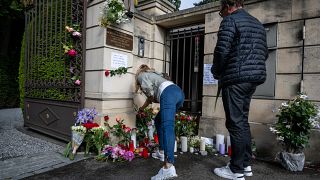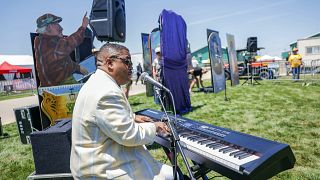USA
A global music superstar. US-Swiss singer Tina Turner passed away on Wednesday (May 24) after a long illness.
She won 12 Grammys and was voted into the Rock and Roll Hall of Fame. With admirers ranging from Mick Jagger to Beyoncé to Mariah Carey, the “Queen of Rock 'n' Roll” was one of the world's most popular entertainers, known for a core of pop, rock and rhythm and blues favourites: "Proud Mary," "Nutbush City Limits," "River Deep, Mountain High," and the hits she had in the '80s, among them "What's Love Got to Do with It," "We Don't Need Another Hero" and a cover of Al Green's "Let's Stay Together."
Rolling Stone Senior Editor, Brittany Spanos, spoke of the late icon's legacy.
“First off, Tina Turner is without a doubt the queen of rock and roll like that is like a label that we cannot take from her and cannot place on anyone else. That is all hers because performance and vocal performance and stage performance in music would not exist without what she did.”
The unstoppable stage performer paired with husband AYK Turner for a dynamic run of hit records and live shows in the 1960s and ‘70s. She survived a marriage in which she experienced domestic abuse to triumph in middle age with the chart-topping "What's Love Got to Do With It."
“The type of career and the type of hurdles that she had to overcome in her life and that she did and that she did sort of surpass anyone's expectations of what a woman could do past the age of 40, after dealing with immense physical and emotional abuse for so many years, was completely unheard of and just - I mean, really barrier breaking on so many levels.”
Overcoming hurdles
Turner was among the first celebrities to speak candidly about domestic abuse, becoming an inspiration to battered women and a symbol of resilience to all.
As she recounted in her memoir, “I, Tina,” Ike began hitting her not long after they met, in the mid-1950s, and only grew more vicious. Provoked by anything and anyone, he would throw hot coffee in her face, choke her, or beat her until her eyes were swollen shut, then rape her. Before one show, he broke her jaw and she went on stage with her mouth full of blood.
Terrified both of being with Ike and of lasting without him, she credited her emerging Buddhist faith in the mid-1970s with giving her a sense of strength and self-worth and she finally left in early July 1976. The Ike and Tina Turner Revue was scheduled to open a tour marking the country’s bicentennial when Tina snuck out of their Dallas hotel room, with just a Mobil credit card and 36 cents, while Ike slept. She hurried across a nearby highway, narrowly avoiding a speeding truck, and found another hotel.
“I looked at him (Ike) and thought, ‘You just beat me for the last time, you sucker,’” she recalled in her memoir.
Solo years
But by the end of the 1970s, Turner’s career seemed finished. She was 40 years old, her first solo album had flopped and her live shows were mostly confined to the cabaret circuit. Desperate for work, and money, she even agreed to tour in South Africa when the country was widely boycotted because of its racist apartheid regime.
Rock stars helped bring her back. Rod Stewart convinced her to sing “Hot Legs” with him on “Saturday Night Live” and Jagger, who had openly borrowed some of Turner’s on-stage moves, sang “Honky Tonk Women” with her during the Stones’ 1981-82 tour. At a listening party for his 1983 album “Let’s Dance,” David Bowie told guests that Turner was his favourite singer.
“She was inspiring, warm, funny and generous," Jagger tweeted Wednesday. "She helped me so much when I was young and I will never forget her.”
A more joyful chapter of her life started when she settled down in Switzerland and married former EMI record executive Erwin Bach.
‘Everything is good'
They met in the mid-1980s, when she flew to Germany for record promotion and he picked her up at the airport. He was more than a decade younger than her — “the prettiest face,” she said of him in the HBO documentary — and the attraction was mutual. She wed Bach in 2013, exchanging vows at a civil ceremony in Switzerland.
“It’s that happiness that people talk about,” Turner told the press at the time, “when you wish for nothing, when you can finally take a deep breath and say, ‘Everything is good.’”
“I think that, you know, there's going to be so much, I feel like in the coming days - there's only so much focus on what she endured early in her life. But at the end of life, she was really at peace and happy,” Rolling Stone senior editor insisted.
"In the final years of her life, she was really able to escape to a quiet life that she really wanted and had desired. And I think she was able to find a lot of peace and happiness."
Turner was born Anna Mae Bullock in a segregated Tennessee hospital in 1939 and would say she received “no love” from either her mother or father.
After her parents separated, she moved often around Tennessee and Missouri, living with various relatives. She was outgoing, loved to sing and as a teenager would check out the blues clubs in St. Louis, where one of the top draws was Ike Turner and his Kings of Rhythm. Tina didn’t care much for his looks the first time she saw him, at the Club Manhattan.
Turner had two sons: Craig, with saxophonist Raymond Hill; and Ronald, with Ike Turner. (Craig Turner was found dead in 2018 of an apparent suicide).
From actress Angela Bassett, who played Turner in a 1993 film, to fans, tributes are pouring from all over the world.












00:50
Kenya: 44 people die due to flooding
Go to video
Burkina Faso Suspends BBC and Voice of America
Go to video
British police charge two men after Channel migrant deaths
01:13
Arab League deplores US veto denying Palestine full UN membership
01:01
Israel-Hamas war: Humanitarian aid parachuted into northern Gaza
01:01
Protests against U.S. military presence in Niger continue